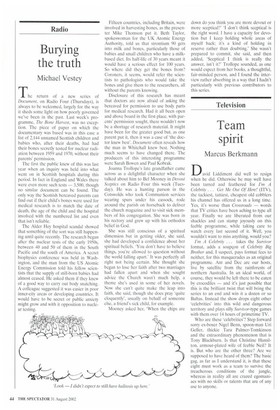Burying the truth
Michael Vestey
The return of a new series of Document, on Radio Four (Thursdays), is always to be welcomed, largely for the way it sheds some light on how poorly governed we've been in the past. Last week's programme, The Bone Harvest, was no exception. The piece of paper on which the documentary was based was in this case a list of 2,144 unnamed Scottish children and babies who, after their deaths, had had their bones secretly tested for nuclear radiation between 1959 and 1970, without their parents' permission.
The first the public knew of this was last year when an inquiry was held into what went on in Scottish hospitals during this period. In fact in England and Wales there were even more such tests 3,500, though no similar document can be found. The only way the Scottish bereaved parents can find out if their child's bones were used for medical research is to match the date of death, the age of the child and the hospital involved with the numbered list and even that isn't reliable, The Alder Hey hospital scandal showed that something of the sort was still happening until quite recently. The research began after the nuclear tests of the early 1950s, between 40 and 50 of them in the South Pacific and the south of America. A secret biophysics conference was held in Washington, and the man from the US Atomic Energy Commission told his fellow scientists that the supply of still-born babies had almost ceased. He asked them if they knew of a good way to carry out body snatching. A colleague suggested it was easier in poor inner-city areas or developing countries. It would have to be secret or public anxiety might grow and with it opposition to nuclear testing. Fifteen countries, including Britain, were involved in harvesting bones, as the presenter Mike Thomson put it. Beth Taylor, spokeswoman for the UK Atomic Energy Authority, told us that strontium 90 gets into milk and bones, particularly those of babies and small children who have a milkbased diet. Its half-life of 30 years meant it would have a serious effect for 100 years. So where did they get the bones from? Coroners, it seems, would refer the scientists to pathologists who would take the bones and give them to the researchers, all without the parents knowing.
Disclosure of this research has meant that doctors are now afraid of asking the bereaved for permission to use body parts for medical research. Had it all been open and above board in the first place, with parents' permission sought, there wouldn't now be a shortage of research material. It might have been for the greater good but, as one parent put it, then it was a case of 'the doctor knew best'. Document often reveals how the man in Whitehall knew best. Nothing much seems to have changed there. The producers of this interesting programme were Sarah Bowen and Paul Kobrak.
Joanna TroHope's late grandfather came across as a delightful character when she talked about him to Bel Mooney in Devout Sceptics on Radio Four this week (Tuesday). He was a hunting parson in the Cotswolds who took Communion services wearing spurs under his cassock, rode around the parish on horseback to deliver the church magazine and to visit sick members of his congregation. She was born in his rectory and grew up with his orthodox belief in God.
She was still conscious of a spiritual dimension but in getting older, she said, she had developed a confidence about her spiritual beliefs. You don't have to believe things, you're allowed to question without the world falling apart.' It was perfectly all right not being certain. She thought she began to lose her faith after two marriages had fallen apart and when she sought advice the Church wasn't much help, a theme she's used in some of her novels. Now she can't quite make the leap into faith, she said, though she does pray 'quite eloquently', usually on behalf of someone else, a friend's sick child, for example.
Mooney asked her. 'When the chips are down do you think you are more devout or more sceptical?' I don't think sceptical is the right word. I have a capacity for devotion but I keep holding whole areas of myself back; it's a kind of holding in reserve rather than doubting.' She wasn't prepared to commit, she said, and then added, 'Sceptical I think is really the answer, isn't it?' Trollope sounded, as one would expect from her books, a thoughtful, fair-minded person, and I found the interview rather absorbing in a way that I hadn't particularly with previous contributors to this series.


























































 Previous page
Previous page